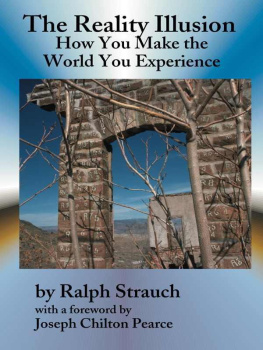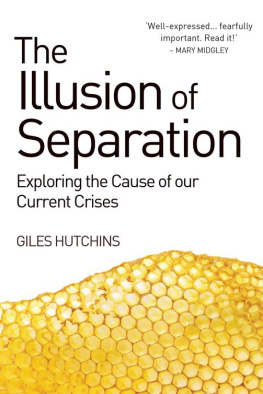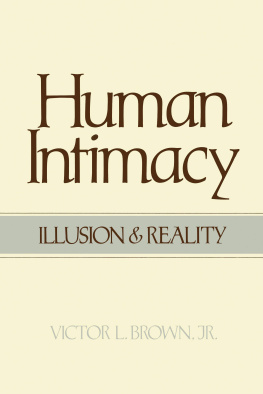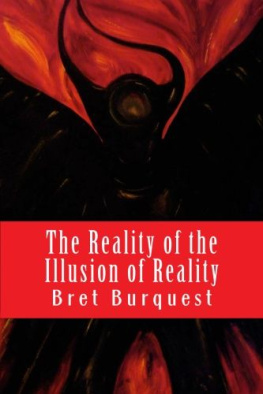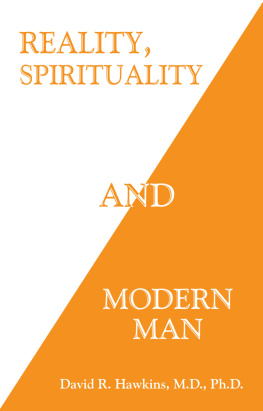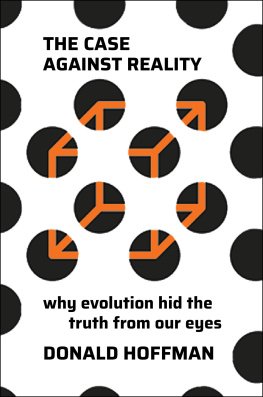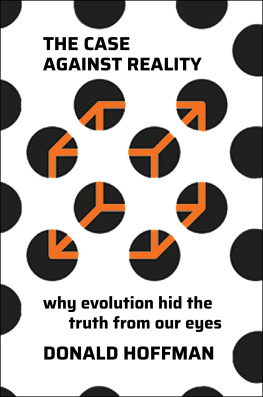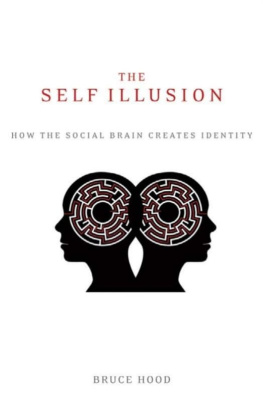The Reality Illusion:
How you make the world you experience
by Ralph Strauch
with a foreword by Joseph Chilton Pearce
To Merna for your part in it all
1983, 1989, 2011 by Ralph StrauchAll rights reserved. No part of this book may be reproduced or transmitted in any form or by any means, electronic or mechanical, including photocopying, recording, or by any information storage and retrieval system without written permission from the author, except for the inclusion of brief quotations in a review.Illustrations by Katarzyna Kozik and Merna StrauchCover photo by Ralph StrauchLyrics from
River of Jordan reprinted with permission.Originally published in 1983 by Quest Books, Wheaton, IL.Current print edition published in 2000 by Somatic Options, Pacific Palisades, CA
www.somatic.com
Contents
Praise for The Reality Illusion:
a tool for bringing mind, brain, and body into alignment, that we might be at peace with ourselves and so with others personal rewards are endless. Joseph Chilton Pearce author of Crack in the Cosmic Egg
unusually clear, accessible account of the mysteries of the multidimensional world. Marilyn Ferguson author of The Aquarian Conspiracy
A powerful learning toola clear guide for taking an important step towards an enlarged way of perceiving our lives. Timothy Gallwey author of The Inner Game of Tennis
Physics and metaphysics a bold attempt at synthesis. Thelma Moss author of The Probability of the Impossible
takes you to the boundaries of your own mind and occasionally makes you gasp with wonder at glimpses of what lies beyond Serge King author of Kahuna Healing
An important contribution to brain/mind and how reality is viewed. Joan Halifax author of Shamanic Voices
Preface to the e-book edition
I wrote The Reality Illusion thirty years ago, when the concepts it explores were relatively new to me and still being formed. They led to a major reorientation of my career and my life, and have been evolving ever since. My understanding of these concepts and their implications has deepened over time, and is certainly richer and more sophisticated now than it was then. But reading it again now and looking back Im heartened by the depth of my understanding then and how well it has held up through the intervening years. Were I writing the book today there are certainly things I would say differently in more depth, perhaps, or with a somewhat different emphasis. But I dont find anything that I disagree with or would significantly change.
The book has been continuously in print during the past thirty years, with small but still steady sales, so apparently readers still benefit from it. I hope this e-book version will expose it to new audiences, who may perhaps find it useful, as well.
You can find some of my more recent writings and musings on my website and blog, at www.somatic.com.
Ralph Strauch
Pacific Palisades, California
February, 2011
Preface to the 2nd edition
It s been over a decade since I began work on The Reality Illusion, and six years since the first edition was published. During that time, a revolution has taken place in the public acceptance of such ideas. A decade ago these ideas were beginning to creep into the fringes of public consciousness. Today they are still outside the mainstream, but the interest in and acceptability of them has grown considerably. This growth appears to be an ongoing natural process, as people seek a deeper understanding of their place in the world than the Western intellectual worldview can provide.
The ideas that we create our own reality and are responsible for our own experience are powerful ones. Opening new possibilities, they also raise new and sometimes troubling questions. Two issues, in particular, are often confusing to people attempting to assimilate these concepts. One concerns the role that a separate external reality plays in our experience, and the other concerns the levels at which we make choices and the relationship between our choices and the outcomes they produce.
WHAT IS IT WE CREATE?
As you begin to contemplate the possibility that you are responsible for more of your own experience than you had heretofore realized, you may wonder if that means that you are the sole creator of all experience. If I create reality, you may ask, does that mean reality exists only in my mind? Are all the situations I face and the people I meet only products of my imagination, with no reality beyond that which I give them?
The resolution of this apparent conundrum lies, I believe, in understanding the difference between creating reality and creating your experience of reality. You create your personal experience of reality that is to say, your individual way of seeing, interpreting, and interacting with the world around you. But you do not create that experience in a vacuum. There is a rich external reality out there independent of you, from which you filter and select the particular pattern of experience that becomes your personal reality.
The people in your life are not your creations; they are separate beings each as powerful and autonomous as you. You create your experience of them, just as each of them creates his or her experience of you. You have no real power over who anyone else is or what they do, only over how you experience and interact with them. But how you (and they) exercise that power to interact can create the illusion of the power to control. If I unconsciously limit my actions based on what you do or what I think you might do, for example, I create the illusion (for both of us) that you have control over me.
An acquaintance who was very much involved with the est training, which teaches similar concepts, once told me about a promotional gathering she had arranged to recruit people for est. Her meeting had produced no recruits, and that troubled her. She had really wanted those people to take the est training, she told me, and the fact that none of them did was making her question whether or not she really could create her own reality.
It was clear, as I listened to her, that she was confusing her ability to create her reality with her ability (or lack thereof) to create their realities. Each of them had, for whatever reasons, decided not to take the opportunity she offered them. Rather than accepting that and examining what it had to teach her (about the way she presented est, perhaps), she chose to feel upset and inadequate, and to waste her time in pointless metaphysical speculation about whether or not that experience negated her new beliefs. Everyone else you meet possesses the same abilities that you do, and deserves respect as an equally autonomous being.
Experience consists of two components events occurring in the external world, and your interpretation of and interaction with those events. The events do exist out there, independent of you, and you have direct control only over your interpretation of and interaction with them. That gives you considerable indirect control over the events themselves, however, because the world as a whole is a responsive and interactive place. Those external events are themselves made up of others responses to your actions, etc., and so are affected by your responses to them. But whatever the events, your ability to change your interpretation of and interaction with them can give you tremendous control over the way you experience them.
This can be clearly seen in the experiences of Jacques Lusseyran, described in his book

